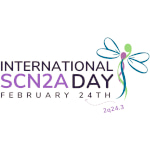International SCN2A Awareness Day Date in the current year: February 24, 2026
 International SCN2A Awareness Day is observed annually on February 24. It was created to raise awareness of disorders caused by a mutation in the SCN2A gene, which include early-onset epilepsy, autism spectrum disorder, and various neurological problems.
International SCN2A Awareness Day is observed annually on February 24. It was created to raise awareness of disorders caused by a mutation in the SCN2A gene, which include early-onset epilepsy, autism spectrum disorder, and various neurological problems.The SCN2A gene encodes for the voltage-gated sodium channel Nav1.2. Sodium channels are specialized protein structures embedded in the membranes of nerve, muscle and some other cell types. They regulate the movement of sodium ions across the cell membrane and play a critical role in the generation and transmission of electrical signals, particularly in neurons and muscle fibers.
Malfunctions in sodium channels can lead to neurological disorders, cardiac arrhythmias, and other medical conditions. For example, mutations in the SCN2A gene affect the alpha subunit of the voltage-gated sodium channel Nav1.2, which is located primarily in the brain, and can cause a variety of neurological conditions, as well as problems in other organs and systems caused by improper conduction of neural impulses.
Medical conditions associated with a mutation in the SCN2A gene include autism spectrum disorder, autonomic dysfunction (a condition in which the autonomic nervous system does not function properly, which can affect the functioning of many organs), cerebral palsy, cortical visual impairment, epilepsy, gastrointestinal dysfunction, intellectual disability, movement disorders, neuropathic pain (pain caused by a dysfunction of the nervous system rather than an injury), sleep disorders, speech and language impairment, and urinary tract problems.
Mutations in the SCN2A gene can affect the sodium channel in two ways: improper channel closing (gain of function) and improper channel opening (loss of function). Improper channel closing causes more sodium ions to enter cells, resulting in excessive firing of neurons, while improper channel opening causes fewer sodium ions to enter cells, resulting in insufficient firing of neurons.
Gain of function mutations are associated with infantile-onset seizures followed by neurodevelopmental delay, while loss of function mutations are associated with autism spectrum disorder and intellectual disability with or without seizures. There are several seizure disorders that can be associated with an SCN2A mutation: benign familial neonatal/infantile seizures, Ohtahara syndrome, infantile spasms/West syndrome, malignant migrating partial seizures in infancy, and Lennox-Gastaut syndrome.
International SCN2A Awareness Day is observed on February 24. The date was chosen to reflect that the SCN2A gene is located on the long (q) arm of chromosome 2 at position 24.3 (2/24). The primary goal of the day is to raise awareness of SCN2A-related disorders and to provide support to individuals affected by these disorders and their families.
International SCN2A Awareness Day should not be confused with International SCN8A Awareness Day, observed on February 9 to raise awareness of epilepsy caused by mutations in the SCN8A gene, which codes another type of sodium channel protein.
- Category
- International Observances
- Tags
- International SCN2A Awareness Day, international observances, awareness days, rare diseases, genetic conditions